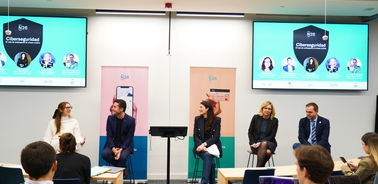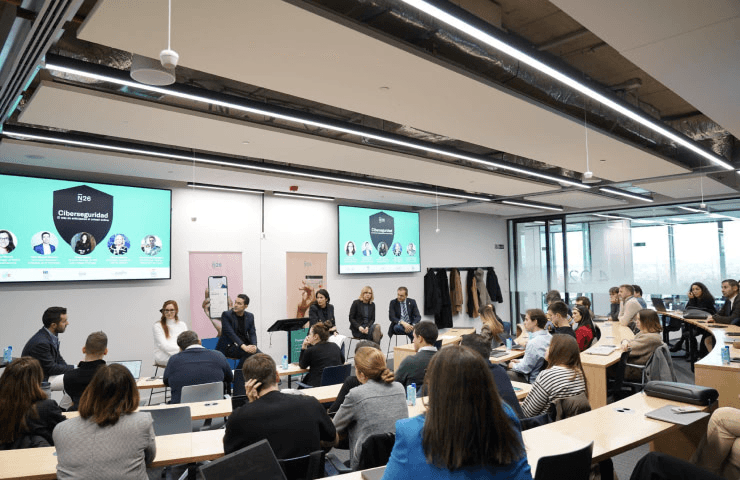IE Sci-Tech School Hosts Cybersecurity Discussion with Online Bank N26

Jose Esteves, Vice Dean of the Sci-Tech School joined experts from N26, Google, ASUFIN and the Spanish Civil Guard to discuss challenges of cybersecurity
The IE School of Science and Technology hosted a roundtable discussion in conjunction with online bank N26 to raise awareness about the importance of cybersecurity with IE Vice Dean of Graduate Programs Jose Esteves, N26 General Manager for Spain & Portugal Marta Echarri and representatives of Google, consumer protection agency ASUFIN and the Spanish Civil Guard.
The experts shared challenges faced in their respective departments due to digitalization and post-Covid trends, as well as the human factors that slow the fight against cybercrime, including a lack of motivation to report and a confidence bias toward technology.
Cristina Pitarch, the General Manager of EMEA Google Cloud Security said the remote work trend had generated an exponential increase in cloud uploads and the appearance of unforeseen security risks.
N26’s Echarri agreed.
“Online meetings risk access to information,” said Echarri, highlighting that for this reason, N26 had to protect itself with additional security measures.
N26 limits access to information to different departments, staff connect to meetings with VPNs whenever they discuss sensitive data and the company employs double authentication for users.
The Head of the Department Against Cybercrime for Spain’s Civil Guard, Antonio Rodriguez discussed the cybersecurity threats Spain currently faces and the reluctance of victims to report crimes.
According to Rodriguez, cybercrimes are increasing by more than 30% yearly, but more than 80% of people do not report them hindering the work of the Civil Guard.
“Many of you do not perceive being scammed on the internet as a great threat,” stated Rodríguez.
Patricia Suarez, Founder and President of ASUFIN, agreed and urged victims to use their experience to raise awareness and give law enforcement the tools to act.
“You have to report,” insisted Suarez. “If you don't report, the crime doesn't exist, and people don't take us seriously.”
Suarez highlighted generational differences associated with cybercrime, pointing out that typically young people fall for simple online scams because they are overly confident with technology and make foolish mistakes.
In contrast, Suarez explained that the problem with older people is that they reject cybersecurity entirely because they don't understand how it works.
Esteves warned that users are not usually ready for cyberattacks – only when tested on their cybersecurity knowledge.
“Be aware that the attack will come at any time. A hacker will never warn you when he is going to attack.” Jose Esteves, IE Vice Dean of Graduate Programs
